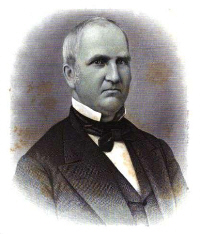 Cushing Biggs Hassell was born near Williamston, in Martin County, North Carolina, on the 14th day of October 1808. His father, John N. Hassell, was an honest and hospitable man. His death occured in the year 1824. He left no property. His wife, Martha Biggs, was a woman of remarkable sagacity, energy and decision of character. For the thirty years prior to her death she was confined to bed with severe rheumatism. In this affliction she displayed wonderful resignation and cheerfulness. She was a zealous member of the Primitive Baptist Church. During the life of his father Cushing Biggs Hassell attended the neighborhood schools at irregular intervals. Here he imbibed a thirst for knowledge and acquired habits of thoughtfulness and studiousness that became the ruling factor in his life. During his idle hours as a merchant he pursued his studies in the classical languages. “While at school he was noted above his fellows for aptness at learning, steady moral habits, and serious disposition. At the age of eighteen he entered into some excellent resolutions, to which he steadfastly adhered through life – to wit: To abstain from the use of liquor and tobacco; not to indulge in profanity or gaming; and to be stricly honest, truthful and upright in all his dealings.”He was twice married. In 1832 he married Mary Davis, who bore him seven children and died in 1846. Three years afterward he married Martha Maria Jewett, widow of Daniel E. Jewett, of Warich, New York. She bore him four children.
Cushing Biggs Hassell was born near Williamston, in Martin County, North Carolina, on the 14th day of October 1808. His father, John N. Hassell, was an honest and hospitable man. His death occured in the year 1824. He left no property. His wife, Martha Biggs, was a woman of remarkable sagacity, energy and decision of character. For the thirty years prior to her death she was confined to bed with severe rheumatism. In this affliction she displayed wonderful resignation and cheerfulness. She was a zealous member of the Primitive Baptist Church. During the life of his father Cushing Biggs Hassell attended the neighborhood schools at irregular intervals. Here he imbibed a thirst for knowledge and acquired habits of thoughtfulness and studiousness that became the ruling factor in his life. During his idle hours as a merchant he pursued his studies in the classical languages. “While at school he was noted above his fellows for aptness at learning, steady moral habits, and serious disposition. At the age of eighteen he entered into some excellent resolutions, to which he steadfastly adhered through life – to wit: To abstain from the use of liquor and tobacco; not to indulge in profanity or gaming; and to be stricly honest, truthful and upright in all his dealings.”He was twice married. In 1832 he married Mary Davis, who bore him seven children and died in 1846. Three years afterward he married Martha Maria Jewett, widow of Daniel E. Jewett, of Warich, New York. She bore him four children.
To illustrate his usefulness as a citizen, it may be stated that he energetically and successfully filled the following positions of usefulness and honor: Trustee of the University of North Carolina, trustee of Williamston Academy, founder, Secretary and Treasurer of Williamston Library Association; Clerk and Master in Equity of Martin County; Treasurer of Martin County; President of the Roanoke Steam Navigation Company; member of the Constitutional Convention of 1861 and also of the Constitutional Convention of 1875. These important positions show the versatility of his usefulness. When first elected treasurer of Martin County only four votes were cast against him. In politics he was a Democrat, and in the struggle of his party to redeem the State in 1875 he exerted all his great power of mind and body. As a campaign speaker he was eloquent and convincing. His statements on public questions were not questioned by his opponents. But his great services to his community, county and State in secular matters were all overshadowed by his work in the ministry of his church.
In 1828 he was baptized by Elder Joseph Biggs and by him received into the fellowship of the Skewarkey Church where he subsequently became pastor.
Additional Resources